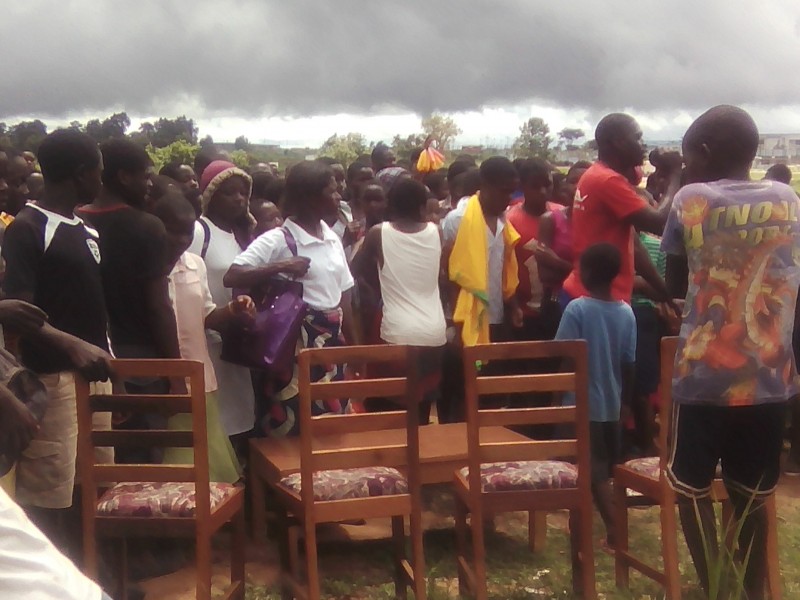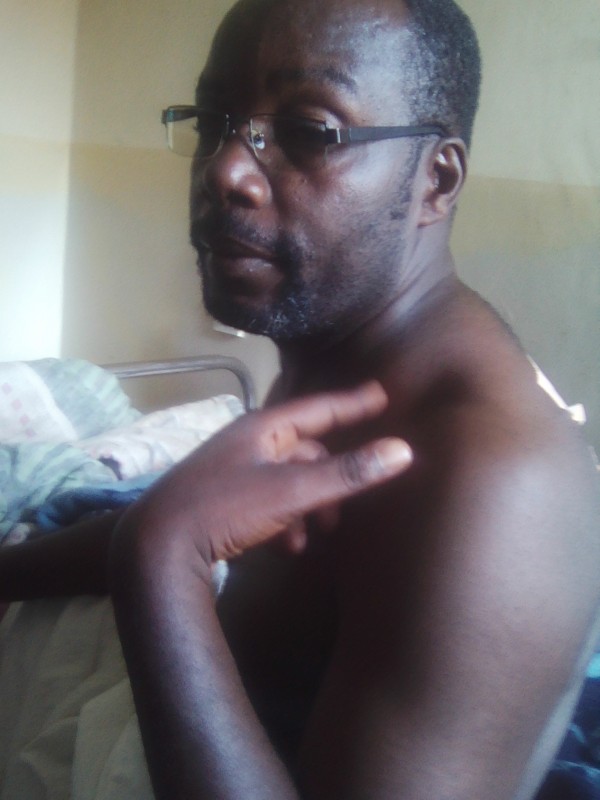By Henry Kijimwana Mhango | The AfricaPaper
Lilongwe, Malawi – A significant number of people are dying in Malawi’s public hospitals from what may seemed curable diseases due to shortage of critical medicine and food to feed patients while in hospitals. The shortage has continued to affect many people, mostly the poor and putting lives in danger in this country of more than 17 million people.
“My patient suffers from Tuberculosis,” said Eliza Banda, one of the guardians of Mzuzu Central Hospital. “The medicine she takes demand her eating frequent balance diet food, but here she eats only once a day normally at 3 o’clock because the hospital has no food to feed patients.”
Under-Funded
Most hospitals are failing to procure adequate medicine from the country’s Central Medical Stores Trust. The Ministry has cut off funding for its hospitals by more than fifty percent, following the freezing of aid by some donors to Malawi because of mismanagement of public funds at Capitol Hill in Lilongwe.
Funding meant to buy drugs and pay for essential services at district hospitals has been slashed from approximately MWK 14 million (equivalent to $21,500) per month to MWK 6 million ($9,230).
Many hospital administrators are accusing the national government of doing little to curb the deplorable health problem. In hospitals such as Ruphi, Karonga, Nkhata Bay and Kasungu, patients are taking medications on empty stomachs, At these facilities, scores of patients were found crying uncontrollably after being told by the medical personnel to buy medicine in private pharmacies because there are limited and in some cases no drugs to treat them.
“My patient is in critical condition and I don’t have any money to buy the drugs,” said Josephine Munthari, another guardian at Mzuzu. ” I’ve been told to buy it at the pharmacy but I don’t know what to do,”
Medical Staff Affected
Public Relations Officer for Mzuzu Central Hospital, Frank Banda alluded to the ongoing health problem adding that the budget cut has also led to poor services. He also stated that it is difficult to carryout essential services with limited supply of materials and in some cases most hospital lack functioning equipment used to diagnose simple illnesses. He said another problem they face is shortage of medical staff.
“Since we have limited number of staff that can not carter for day and night shifts, we deliberately introduced hardship allowance scheme known as Locum for those doubling their shifts, and we could at least be able to reach many patients in wards,” Banda said..
“Now that we have been deducted our funding by over 50 percent, we have terminated this scheme and we should expect crisis to our service delivery.
No X-Ray Services

Officials at the hospital say the facility has since suspended X-ray services because the facility’s X-ray machine is no longer functioning due to lack of money for repairs.
“Patients are referred to Bwaila (bottom hospital) for X-ray, and go back to Kamuzu Central with results,” says one of the medical doctors at the hospital also refused to be named for fear of reprisals. “This is dangerous because some are dying while going through these delays.”
The doctor says there is also critical shortage of some essential drugs at the hospital such as Tramadol hydrochloride, dicpofenac sodium, ceftriaxone, benzypenicillin sodium and many others.
“These are drugs which must always be there at a central hospital level. Not just drugs, but also a wide variety of other medical supplies,” he added.
Maternal Complications
The AfricaPaper’s visit to Rumphi District Hospital, in the country’s northern region established that these challenges make most workers to develop a negligence work spirit, which is leading to many maternal complications at facility.
For instance, our visit to the hospital’s maternity ward found a young lady, Tionge Kasanga, in critical condition after losing her baby due to negligence by health workers.
“There was no or any medical personnel by the time I started feeling severe pains, some came after some 10 hours at night but could not assist me, claiming the one on duty was not available,” Kasanga explained.
By the time the staff on duty arrived, things had already gone worse for Tionge, 28. She was taken to the delivery theatre but the medical officer only managed to save the victim’s life because the baby had already dead.
Malfunctioning Mortuary
The Hospital’s Nursing Officer only identified as Mr. Nyasulu said the financial constraints have heavily hit the institution to the extent that it is even failing to repair it mortuary which has been malfunctioning for several months.
“The mortuary’s refrigerators are broken, and the hospital has no money to repair them,” said Mr Nyasulu. “Therefore, we don’t allow corpses to spend a day here because we have no place to keep it.”
Losing Innocent Lives
At Dedza District Hospital based in the central region, at least six patients are reportedly dying every day due to critical shortage of essential drugs.
Spokesperson for workers at the hospital, Aaron Chirwa told the media recently “medical practitioners are traumatized with the dare drug situation at the hospital, we are losing innocent lives that would have been saved if we had medicine.”
Mismanaged Public Funds
But despite all these challenges, government continues to mismanage public funds that would have helped to address the worrisome health problems in the country.
For instance, a Parliamentarian for Rumphi East Constituency, Mr Kamlepo Kalua who is also Vice Chairperson for Parliamentary Public Accounts Committee, recently accused the administration of President Peter Mutharika for misusing about US $ 4.5million to buy posh cars for the President, his Vice, Saulos Chilima and other government officials while Malawians are suffering.
“Government recently bought four posh vehicles for the President, two for his Vice all together worth MwK One billion, a Land cruiser vehicle for the Chief Secretary George Mkondiwa, and ten Prado’s for the principal secretaries,” Kalua claimed in Parliament.
“We have all the evidence to prove this, we have the chasis numbers, we have the engine numbers,” he revealed.
But government spokesperson Jappie Mhango denied the claims.
Tax Payers’ Millions
In October 2015, President Mutharika also attracted public criticism for travelling to the United Nations general assembly with 111 crew which drew a lot of tax payers millions of dollars intended for various developments to uplift their livelihood.
Reports indicate that government spent about US $2,000 for each individual return ticket to New York, United States of America, and US $ 250 for accommodation per night.
On airfare alone, Malawi is reported to have spent about US $270,000, and US $ 310 on accommodation for 111 delegates per day for a period if two weeks.
Though government is reluctant to disclose to its citizens the amount of money spent for the trip, our additions suggests that a minimum of US $640,000 was used for the trip.
Looking at budgetary allocations of district hospitals in Malawi, that in a month get almost US $3,7000, the financial resources that government used to send this huge delegation to the UN is enough to fund 14 district hospitals in a month.
“As small as Malawi’s economy is, it is surprising therefore that the country can afford to send a delegation of 111 people to a UN meeting, more especially at a time the economy is in shambles,” said Timothy Mtambo, human rights activist.
Public Protest
The government financial resources management and critical food and drug shortages have influence protests by workers in various public hospitals, joined by civil society organizations and the public at large to pressurize government improve the situation.
However, the ruling Democratic Progressive party supporters have been interfering such protests by staging counter protesters on the streets of Malawi.
As the situation escalates, the hospitals officials are depending on begging food for the patients from local well-wishers such as parliamentarians, business persons and district councils.
Minster Blames Suffering Staff

But responding to the concerns, Jappie Mhango, the government spokesperson who also serves as Minister of Information pours the blame on the health workers for what he calls, stealing drugs and misusing public resources allocated for running their hospitals. But, Jappie can’t produce any evidence to buttress his claims.
“Our health workers are not honest, otherwise we have never cut budgetary allocations for our health system,” Jappie Mhango told the media.
But healthy officials have heavily attacked the minister’s claims.
“As soon as reports of food and drugs shortages reached him, a responsible Minister’s remedial action should have been taken right away,” said concerned medical officials at Mzuzu central hospital who opted for anonymity.
“The public would have been informed about what was uncovered (drug theft), who did that? who got arrested, or dismissed? And finally preventive measures or the way forward.”
Failing Malawians and the Country
According to many interviewed by The AfricaPaper in various hospitals, Minster Jappie Mhango failed to do the country justice by not taking the actions stated above. Instead, the minster continues to blame suffering medical staff in hospitals that he has not visited in many months, according to people interviewed.
Other Medical officials from Kasungu, Karonga and Rumphi District hospitals, also declined to have their names published for fear of reprisals said “what the Minister of Information says is incorrect, and tantamount to legal suits, no hospital in Malawi has got its whole proposed budget.”
Recently, the Ministry of Health imposed a policy, barring District and Central Hospitals’ officials to give out information to the media, a move several quarters feel is deliberately put by government to harass and mute health officials from expressing out challenges affecting their service delivery and the collapsing medical system in the country . |TAP| Africa’s Newspaper of Record
The AfricaPaper: Based in Malawi, Henry K. Mhango writes for The AfricaPaper. He has worked for various media organizations including the state Malawi News Agency, the Big Issue Malawi Magazine, Capital Radio Malawi, and International Network of Street News Service (UK). His work has also been published by The Guardian (UK). He covers politics, economy, human rights, environment and development for The AfricaPaper.








































